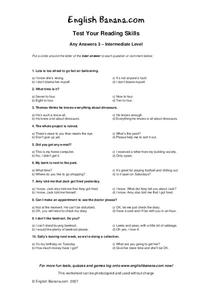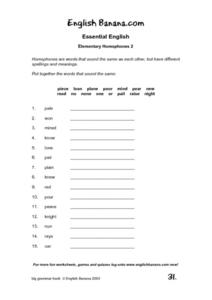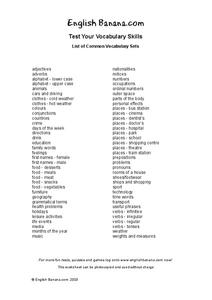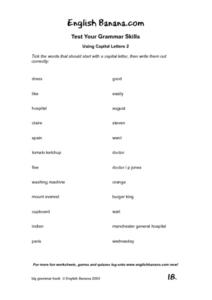Curated OER
Test Your Reading Skills-- Any Answers 3
In this language arts worksheet, 4th graders read a question or comment that might be made in conversation. From a list of 4 responses, students choose the one that best answers the question or responds appropriately to the comment.
Curated OER
My Pocket IT Glossary-- A-Z of Computer Words (Nouns)
In this language arts worksheet, students learn the meanings of 12 computer technology vocabulary words. Students examine 12 small boxes with one word in each. There are no directions but students could write definitions or sentences.
Curated OER
My Pocket IT of Computer Words- Nouns
In this language arts and technology worksheet, students become familiar with 12 nouns pertaining to computer technology by making a pocket glossary.
Curated OER
Rhyming Words
In this Language Arts worksheet, students read three lists of a variety of words. The words are categorized according to their word family.
Curated OER
Where Do You Work?
In this language arts and social studies worksheet, learners read 20 clues about a person's occupation. Students use the word bank to locate where each person works. Example: I am a nurse. I work at the ___(hospital).
Curated OER
"Wh--" Questions
In this language arts worksheet, students learn the proper use of the question words: what, where, when, who and why. Students read the clues, then complete each sentence, beginning each on with the correct question word.
Curated OER
Using Present Perfect Tense 1
In this language arts worksheet, students analyze 15 sentences with missing past participles. Students read the sentences and make the verb tense correct. Example: I've (be)____ to France twice.
Curated OER
Finish the Sentences 2
In this language arts worksheet, students read the beginning of 15 sentences and give an appropriate ending either in writing or orally. Example: The problem is that _____.
Curated OER
Polite Or Impolite Sentences-- Matching Activity
In this language arts worksheet, students cut apart 14 pairs of cards: one polite sentence and one matching rude sentence. Students mix them up and match, identifying which one is polite or rude and why.
Curated OER
Good Advice 3
In this language arts worksheet, students match 20 questions with their logical "good advice" answers. Example: Do you always wake up late? (Buy an alarm clock!)
Curated OER
Really Useful List of 100 Plural Nouns in English
For this language arts worksheet, students analyze a list of 100 nouns which do not follow the usual rule of adding an -s to make a plural. Students fill in the blanks of the chart and make irregular plurals. Example: tooth (teeth).
Curated OER
Information Exchange--General Purpose Template
In this language arts learning exercise, students learn to give concise oral directions as they collaborate with a partner. Students tell their partner to place a number or letter in a particular box on the grid using a prepositional...
Curated OER
Elementary Homophones 2
In this language arts instructional activity, students discover that homophones are words that sound the same but are spelled differently. Students match 15 homophones.
Curated OER
More Adjectives and Synonyms 1
In this language arts worksheet, students discover that synonyms are words that mean the same as other words. Students read and analyze 15 words and using a word bank, match them with a synonym.
Curated OER
Comparatives and Superlatives 4
In this language arts worksheet, students learn the comparative and superlative forms of 10 adjectives. Students write the appropriate form of the adjectives, spelling them correctly on the lines. Example: dirty (dirtier, dirtiest).
Curated OER
Describing People 1
In this language arts worksheet, students read 5 detailed descriptions of people. Students draw a picture of each of the people described. Students then draw 5 more people and write their own description of each one.
Curated OER
List of Common Vocabulary Sets
In this language arts worksheet, students examine lists of common vocabulary sets. There are now directions given with this worksheet which can be used as teacher reference.
Curated OER
Question Forms Using Verb "to do" as an Auxiliary Verb (Present Simple Tense) 3
In this language arts learning exercise, students analyze 10 sentences which have the words in scrambled order. Students rearrange the words to make a question using the verb "to do." Example: you do OK feel (Do you feel OK?)
Curated OER
Question Forms Using Verb "to do" as an Auxiliary Verb (Present Simple Tense) 1
In this language arts activity, learners examine 10 sentences which are scrambled. Students rearrange the words to make each question correct, using the verb form of "to do." Example: do you how do (How do you do?)
Curated OER
Question Forms Using Verb "to have" as an Auxiliary Verb (Present Perfect Tense) 2
In this language arts worksheet, students examine 10 scrambled sentences. Students rearrange the words to make a questions using verb "to have" as an auxiliary verb in the present perfect tense. Example: you her have before been (Have...
Curated OER
Question Forms Using Verb "to have" as an Auxiliary Verb (Present Perfect Tense) 3
For this language arts worksheet, learners examine 10 sentences which are scrambled. Students rearrange the words in each sentence to make a question using verb "to have" as an auxiliary verb in the present perfect tense. Example: when...
Curated OER
Using Capital Letters 2
In this language arts worksheet, students examine a list of 30 mixed common and proper nouns. Students indicate which words should be capitalized and write them out correctly.
Curated OER
Using Capital Letters 1
In this language arts worksheet, learners analyze a list of 30 mixed common and proper nouns. Students mark which words should start with a capital letter and write them out correctly.
Starfall
Xx is in Six
In this language arts learning exercise, students learn to print both upper and lower case letter Xx. Students trace several examples before forming their own letters in the unlined boxes.

























